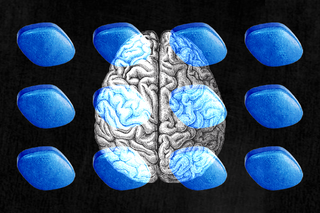
Viagra May Help Treat Alzheimer’s Disease, Suggests Study
“Being able to repurpose a drug already licensed for other health conditions could… bring about life-changing dementia treatments sooner.”

Viagra’s origin story is accidental. Scientists in the early ’90s discovered it as a heart drug owing to its benefit in improving blood flow. It was later discovered that it helped widen the arteries of the penis too, and gained its rightful place as an erectile dysfunction drug.
Now, experts think it could have other benefits too — such as in helping treat Alzheimer’s disease, the most common age-related dementia which impacts memory, cognition, and behavior. Using gene mapping, researchers at the Cleveland Clinic in the U.S. established a correlation between Viagra use and reduced risk for Alzheimer’s. Published in Nature Aging, the study looked at 1,600 drugs approved by the Food and Drug Administration (FDA) and how they target two hallmark proteins of Alzheimer’s — amyloid and tau — two proteins that “go rogue and destroy brain cells.“
“Sildenafil [the brand name of Viagra], which has been shown to significantly improve cognition and memory in preclinical models, presented as the best drug candidate,” Dr. Feixiong Cheng, lead author of the study, said.
The researchers then analyzed health insurance claim data from over 7.2 million people in the U.S. They foundclaimants who took sildenafil had a 69% lesser likelihood of developing Alzheimer’s over the next six years as compared to people who didn’t use the drug. The correlation was consistent even for those with hypertension and diabetes, which are risk factors for those with Alzheimer’s.
Viagra turned out to be the golden (and blue) drug of choice because it targets the proteins that accumulate inthe brain due to dementia. The drug was found to increase brain cell growth as well when scientists studied human tissue.
The research is interesting for the prospect it puts forward. Repurposing an existing drug — an erectile dysfunction drug — is quicker and cheaper and may help develop a brand new treatment. “Developing drugs for diseases like Alzheimer’s, which attack the brain, is a costly process and can take many years,” Dr. Susan Kohlhaas, director of research at Alzheimer’s Research UK, told The Guardian. “Being able to repurpose a drug already licensed for other health conditions could help speed up the drug discovery process and bring about life-changing dementia treatments sooner.”
Related on The Swaddle:
Scientists Develop Test To Predict Who Can Develop Alzheimer’s
Notably, Alzheimer’s treatments have baffled scientists. The diagnosis, treatment, and prevention have all moved at a snail’s pace, each finding offering a stray ray of hope. Earlier this year, scientists identified the brain cells most vulnerable to degeneration in a major breakthrough. In 2020, researchers devised a blood test to detect Alzheimer’s years before it showed symptoms.
The prospect of refashioning a licensed drug as a treatment option thus holds appeal. While the study was layered and involved a big sample of people, there are critical limitations. The research doesn’t establish definitive causation between Viagra and Alzheimer’s; people who took sildenafil may have other reasons for not developing the disease. The drug may not reduce Alzheimer’s risk or stop the disease. This also means rushing to take sildenafil as a preventative measure for Alzheimer’s is misguided and may not work.
Moreover, the findings do not encase the gender question. Researchers have noted previously how Alzheimer’s predominantly affects women. “By 2050, the number of people with Alzheimer’s disease in India is expected to triple from what it is now; most new cases will be among the generation reading this article now; most patients will be women,” The Swaddle noted in an article. This makes it all the more crucial to develop tests to predict it as early as possible.
So far, sildenafil’s efficacy on women’s sexual dysfunction has shown mixed results. So while the correlation between sildenafil and Alzheimer’s was found in men, the same cannot yet be established for others.
“The only way to test this would be in a large-scale clinical trial measuring sildenafil effect against the usual standard of care,” the researchers noted, adding they will now conduct randomized trial to test the drug’s efficiency on different sexes.
But the findings are an interesting new starting point to Alzheimer’s treatment. “More than ever before, Alzheimer’s researchers understand that a variety of approaches will be needed — most likely used in combination — for effective treatment of the disease,” Claire Sexton, of the Alzheimer’s Association in Chicago, who wasn’t involved with the study, told MedPage Today.
Dr. Ivan Koychev, a senior clinical researcher at the University of Oxford, who was not involved in the study, also called it “an exciting development” because “it points to a specific drug which may offer a new approach to treating the condition.”
Saumya Kalia is an Associate Editor at The Swaddle. Her journalism and writing explore issues of social justice, digital sub-cultures, media ecosystem, literature, and memory as they cut across socio-cultural periods. You can reach her at @Saumya_Kalia.
Related


Omicron May Shape the Vaccine Booster Dose Debate in India
